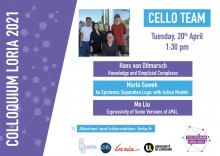Le prochain colloquium du Loria aura lieu le mardi 20 avril à 13h30 sur Teams.
Nous sommes ravis d’accueillir l’équipe CELLO, avec des présentations de Hans van Ditmarsch, Marta Gawek et Mo Liu.
Programme et résumés :
- 13:30 – 14:00 : speaker: Hans van Ditmarsch, CELLO @ LORIA
Title: Knowledge and simplicial complexes
Abstract: Simplicial complexes are a versatile and convenient paradigm on which to build all the tools and techniques of the logic of knowledge, on the assumption that initial epistemic models can be described in a distributed fashion. Thus, we can define: knowledge, belief, bisimulation, the group notions of mutual, distributed and common knowledge, and also dynamics in the shape of simplicial action models. We give a survey on how to interpret all such notions on simplicial complexes, building upon the foundations laid in prior work by Goubault et al. More recent work investigates so-called impure simplicial complexes, that also take into account crashed processes.
- 14:00 – 14:30 : speaker: Marta Gawek, CELLO @ LORIA
Title: An epistemic separation logic with action models
Abstract: We investigate extensions of separation logic with epistemic and dynamic epistemic modalities. Separation logics are based on the intuitionistic logic of bunched implications (BI) or its classical counterpart Boolean BI. These logics combine additive and multiplicative connectives in the language, expressing the notions of resource composition and resource decomposition. Epistemic Separation Logic with Action Models (ESLAM) is a generalization of the Public Announcement Separation Logic (PASL) of Courtault et al. We present the syntax and semantics of ESLAM as well as reduction axioms for the elimination of dynamic modalities.
- 14:30 – 15:00 : speaker: Mo Liu, CELLO @ LORIA
Title: Expressivity of some versions of APAL
Abstract: Arbitrary public announcement logic (APAL) is a logic of change of knowledge with modalities representing quantification over announcements. It extends public announcement logic (PAL). We present three rather different versions of APAL: FSAPAL only quantifies over announcements containing a finite subset of all propositional variables. SCAPAL only quantifies over announcements containing variables occurring in the formula bound by the quantifier. IPAL quantifies over announcements implying a given formula. We determine the relative expressivity of FSAPAL, SCAPAL and IPAL in relation to APAL and PAL.
Plus d'infos sur le site du Loria

